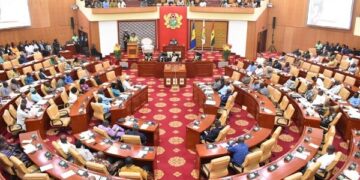Government has completed the divestiture of Jubilee Oil Holdings Limited (JOHL) shares, an offshore entity, to GNPC Explorco, a subsidiary of the Ghana National Petroleum Corporation (GNPC).
This move, as detailed in the report by Parliament’s Committee on Mines and Energy during the third session of the 8th Parliament, addresses longstanding concerns raised by watchdogs, including the Public Interest and Accountability Committee (PIAC), regarding the use and management of oil revenues.
The transfer of shares to Explorco aligns with a directive from Parliament instructing GNPC to expedite the process, showcasing the influence of civil society and regulatory bodies in shaping Ghana’s energy policies and governance.
JOHL, initially acquired by GNPC through a share purchase agreement in 2021, holds a 7 percent commercial interest in the Jubilee and TEN oil fields. However, controversy arose due to its incorporation in the Cayman Islands, a tax haven, leading to concerns about transparency, accountability, and the risk of revenue leakages, which are in violation of the Petroleum Revenue Management Act (PRMA).
JOHL has proven lucrative despite the delayed transfer, with a reported gross margin of $207 million in 2022 from the Jubilee and TEN fields. PIAC has, however, expressed concerns about GNPC using JOHL for unapproved operations, such as cash calls on Springfield and ENI Block 4 and decommissioning the Saltpond oil rig.
While acknowledging the government’s action, PIAC emphasized the importance of revenues from Explorco’s operations being lodged in the Petroleum Holding Fund (PHF).
“PIAC has always been in constant discussions with GNPC, therefore we are not surprised with the current development. GNPC has since exhibited good faith by telling PIAC in its meetings that they are working on transferring the shares to Explorco”, noted the Technical Manager at PIAC, Mark Agymang.
Head of Policy, Petroleum and Conventional Energy at Africa Centre for Energy Policy (ACEP), Kodzo Yaotse, has also stressed the need for thorough accountability of the revenues accrued to JOHL despite the transfer’s belated status.
This development highlights the delicate balance between economic interests, regulatory oversight, and public accountability in Ghana’s oil and gas sector, emphasizing the need for transparency and adherence to established governance mechanisms.




















































































